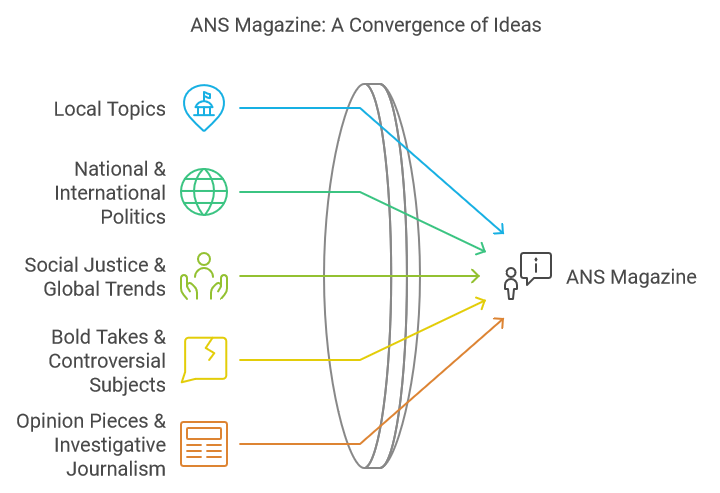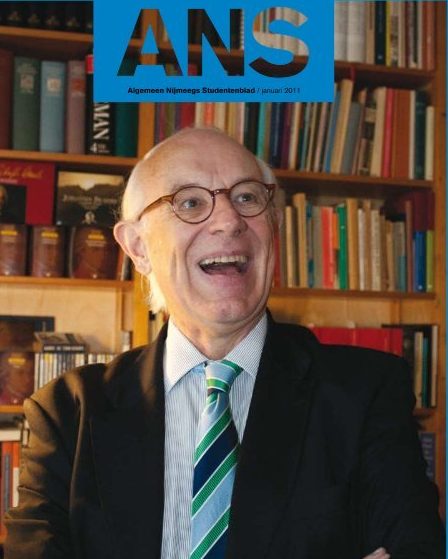The Algemeen Nederlands Studentenblad (ANS) is an independent student magazine originally established in 1985, serving students at Radboud University Nijmegen in the Netherlands. Initially founded by the local student union AKKU, ANS is now managed by Stichting Multimedia, an organization responsible for publishing the magazine.
ANS is well-known for its thought-provoking content, including articles that cover a broad range of student-related issues, from local events and cultural reviews to national and international political matters. Over the years, the magazine has gained attention for its controversial articles, such as one in 1989 advocating for marijuana use as a study aid, which garnered national media coverage.
In addition to written content, ANS has also been a launchpad for creative work. For instance, the popular Dutch comic strip DirkJan, created by Mark Retera, first appeared in ANS before gaining wider recognition.
Despite its student-centric approach, the magazine has occasionally faced challenges, such as the refusal of Radboud University to distribute it in 2010 due to disagreements over its editorial stance.
History of ANS
Founding and Purpose
Algemeen Nederlands Studentenblad was founded in 1985 by the local student union AKKU. At its core, ANS was created as a platform for student voices, a place where issues affecting university life and the student experience could be discussed openly. The founders wanted to provide an outlet that could offer news and commentary on everything from campus events to national politics, reflecting the diverse interests of the student body at Radboud University.
Evolution
Over time, ANS transitioned from being solely a student union publication to being managed by Stichting Multimedia, an independent organization. This transition allowed for broader editorial freedom and further strengthened its position as an independent student publication. Under its new management, ANS continued to evolve, expanding its range of topics and solidifying its reputation for tackling controversial subjects. A key milestone in its development was its bold 1989 article advocating for the use of marijuana as a study aid, which drew national media attention.
Despite challenges, including opposition from the university administration in 2010, ANS has remained a resilient and influential voice in the Dutch student landscape, continuing to offer students a space for journalistic and creative expression.

Content and Themes
Algemeen Nederlands Studentenblad (ANS) covers a wide array of topics that reflect the interests and concerns of students at Radboud University and beyond. The magazine’s content spans from local university news to broader societal issues, providing a balanced mix of articles that resonate with its readership.
Diverse Range of Topics
ANS regularly features articles on university life, including updates on academic policies, student initiatives, and campus events. These local topics are complemented by national and international political discussions that encourage students to think beyond their immediate environment. The magazine covers social justice issues, political movements, and global trends, making it a platform for students to engage with critical global topics.
Moreover, ANS is known for its bold takes on controversial subjects, offering opinion pieces and investigative journalism that often challenge societal norms. This has helped establish its reputation as a space where students can explore and express their views freely, contributing to lively debates on campus.
Cultural Impact
Beyond news and politics, ANS also plays an important cultural role within the student community. The magazine features reviews of films, music, books, and other cultural events, offering students a chance to discover and critique contemporary works. These cultural reviews, alongside event coverage, are particularly popular among students, as they provide recommendations and insights that align with student interests and social life. ANS’s cultural content helps shape student culture at Radboud, fostering a shared intellectual and creative environment.
Controversies and Impact
Controversial Moments
Over the years, ANS has not shied away from controversy, often publishing content that sparks debate both within and outside the university. One notable example occurred in 1989, when the magazine published an article advocating for the use of marijuana as a study aid. The article attracted significant attention, with coverage in national media outlets, sparking conversations on drug policy and student life. This bold editorial choice exemplifies ANS’s willingness to tackle taboo subjects and its commitment to representing diverse student opinions.
Rejection by Radboud University
ANS’s independent stance has occasionally put it at odds with Radboud University administration. In 2010, the university refused to distribute the magazine due to disagreements over its editorial content. The refusal highlighted tensions between institutional authority and journalistic freedom, with the university citing concerns about the magazine’s critical stance on university policies. This incident underscored ANS’s role as an independent voice, committed to holding university administration accountable and providing a platform for student critique, even when it causes friction.
Despite these challenges, ANS has maintained its influence and relevance, continuing to be a respected publication among students. Its editorial independence and willingness to confront difficult issues have cemented its place as an essential part of student life at Radboud University.

Conclusion
The Algemeen Nederlands Studentenblad (ANS) plays a vital role in student life at Radboud University by offering a platform for independent, student-driven journalism. It has consistently provided students with a space to voice their opinions, engage with important local and global issues, and reflect on university life. As a publication that covers a diverse range of topics—from campus events to political debates—ANS serves not only as a news outlet but also as a cultural and intellectual forum that stimulates discussion and critical thought among students.
Its legacy of addressing controversial issues and challenging institutional norms continues to make ANS a significant presence at Radboud University. Moreover, ANS offers students unique opportunities to develop their skills in journalism, writing, and creative arts, acting as a launchpad for budding journalists and content creators. By fostering critical engagement and creativity, ANS remains a crucial element of student culture, empowering students to shape their own narratives and impact their academic and social communities.
FAQ
1. What is ANS?
ANS (Algemeen Nederlands Studentenblad) is an independent student magazine established in 1985 at Radboud University Nijmegen. It offers students a platform to express their views on university life, culture, and global political issues through journalism and creative writing.
2. Who manages ANS?
ANS was originally founded by the local student union AKKU but is now managed by Stichting Multimedia, which allows for broader editorial freedom while still keeping the publication student-driven.
3. What topics does ANS cover?
ANS covers a diverse range of topics including local university news, national and international political issues, and cultural reviews. The magazine also offers opinion pieces, investigative journalism, and creative works that resonate with student interests.
4. Why is ANS important for students?
ANS provides students with a platform to express their opinions, explore controversial topics, and engage with important social and political issues. It is a space where students can gain experience in journalism and creative fields, making it a valuable resource for personal and professional development.
5. Has ANS faced any controversies?
Yes, ANS has often been involved in controversies. For example, in 1989, it published an article promoting marijuana use as a study aid, which attracted national media attention. In 2010, Radboud University refused to distribute the magazine due to disagreements over its editorial stance, highlighting tensions between the publication and the university.
6. What opportunities does ANS provide for students?
ANS serves as a launchpad for aspiring journalists, writers, and creatives by giving them the opportunity to hone their skills in a real-world publication setting. It has also been a platform for creative works, such as the Dutch comic strip DirkJan, which first appeared in ANS.
7. Can students contribute to ANS?
Yes, ANS is student-driven and encourages contributions from the student body. This gives students the chance to engage in journalism, contribute to editorial discussions, and develop content on topics of interest to their peers.
8. Is ANS still relevant today?
Despite challenges and controversies, ANS remains highly relevant. It continues to serve as an essential platform for student voices, covering issues that are important to the university community while providing opportunities for journalistic and creative expression.




